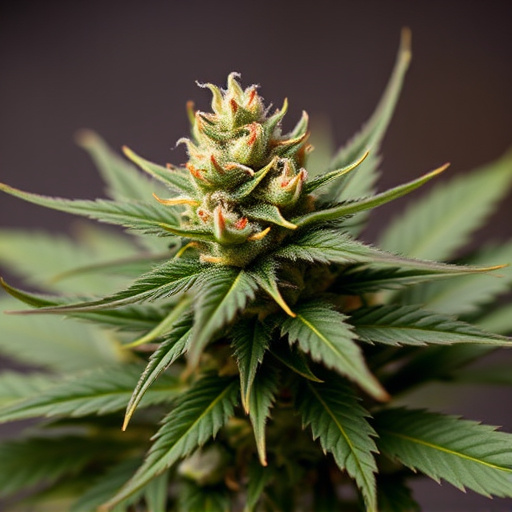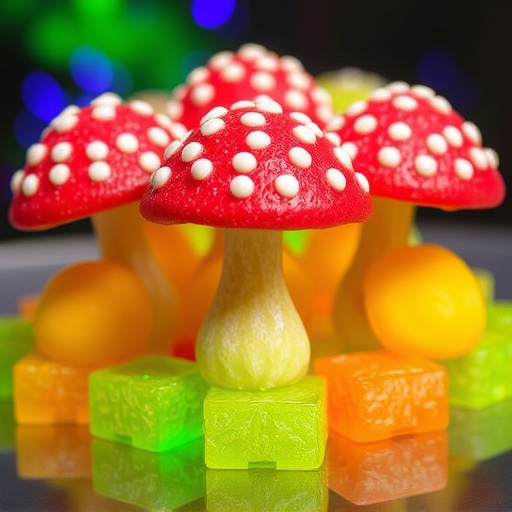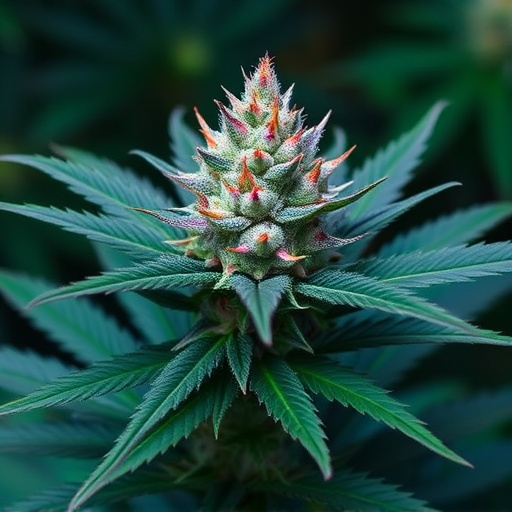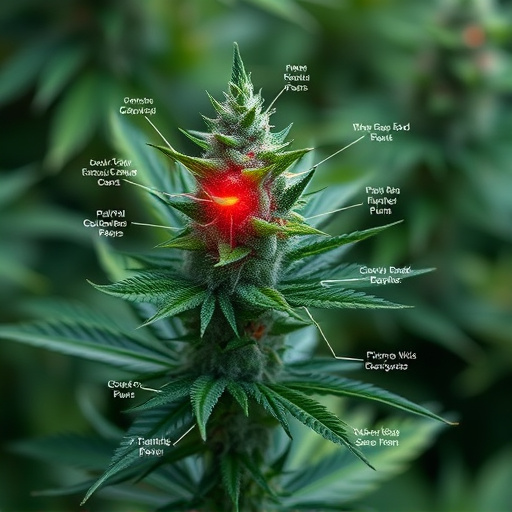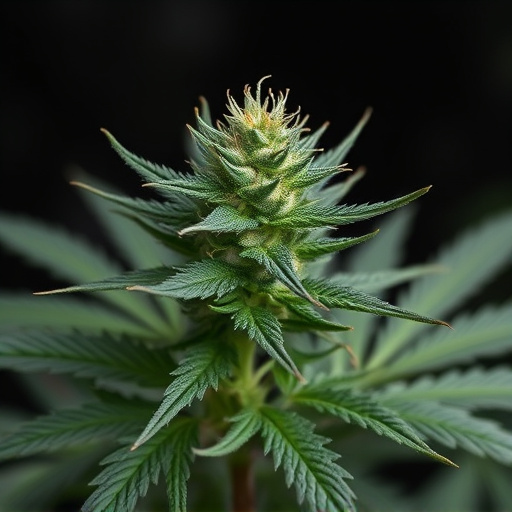Cannabis interacts with dopamine and serotonin, "feel-good" chemicals that regulate mood, motivation, pleasure, and physical sensations like pain. Imbalances in these neurotransmitters are linked to mental health conditions including depression and chronic pain. THC in cannabis stimulates dopamine release, offering potential relief for neuropathic pain, while CBD influences serotonin receptors, aiding mood and pain management. Specific strains of cannabis for pain with varying cannabinoid profiles interact with the body's endocannabinoid system, making cannabis a promising therapeutic option for chronic pain.
“Unraveling the complex relationship between cannabis and our brain’s chemical messengers, this article explores how the plant’s compounds interact with dopamine and serotonin, key players in reward and mood regulation. Understanding these neurotransmitters’ functions is crucial to comprehending cannabis’s effects on the mind and body.
We’ll delve into the science behind cannabis consumption, its impact on dopamine and serotonin systems, and even examine specific strains known for their potential in pain management, offering a comprehensive guide for those seeking natural relief.”
- Understanding Dopamine and Serotonin: The Neurotransmitters of Reward and Mood Regulation
- Cannabis and its Impact on Dopamine and Serotonin Systems
- Strains of Cannabis for Pain Management: A Look at Their Effects on Neurotransmitters
Understanding Dopamine and Serotonin: The Neurotransmitters of Reward and Mood Regulation
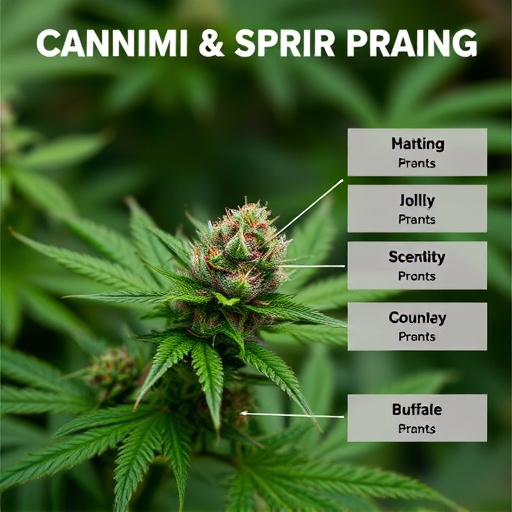
Dopamine and serotonin are two key neurotransmitters that play vital roles in regulating mood, motivation, pleasure, and even physical sensations like pain. Often referred to as the “feel-good” chemicals, they are integral to our daily experiences and overall well-being. Dopamine is associated with reward and motivation, releasing when we enjoy a delicious meal or experience thrill-inducing activities. Serotonin, on the other hand, is linked to mood stability, appetite control, and even sleep patterns. Imbalances in these neurotransmitters have been connected to various mental health conditions, including depression, anxiety, and chronic pain.
In the context of cannabis use, especially for strains known for their analgesic (pain-relieving) properties, understanding how this plant interacts with dopamine and serotonin is essential. Certain cannabinoids present in cannabis, such as THC and CBD, have been shown to modulate dopamine and serotonin levels in the brain. THC, responsible for cannabis’ psychoactive effects, can bind to receptors that influence both dopamine and serotonin, potentially offering relief for conditions like neuropathic pain or chronic pain syndromes. Meanwhile, CBD, non-psychoactive but increasingly recognized for its therapeutic benefits, has been studied for its ability to interact with serotonin receptors, suggesting it could be a valuable tool in managing mood and pain.
Cannabis and its Impact on Dopamine and Serotonin Systems
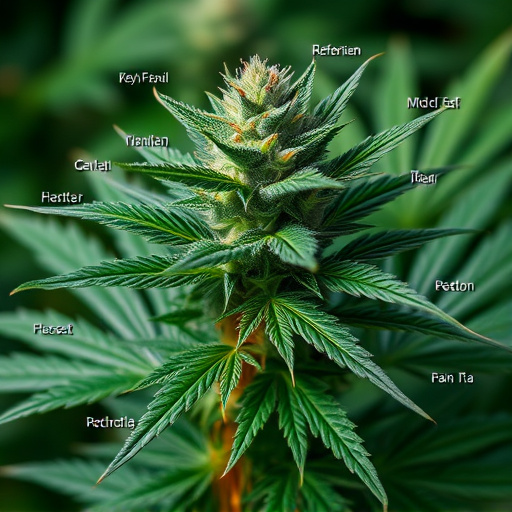
Cannabis has been shown to interact with the brain’s dopamine and serotonin systems, which play crucial roles in mood, motivation, and pain perception. When someone consumes cannabis, its various compounds, particularly tetrahydrocannabinol (THC) and cannabidiol (CBD), bind to specific receptors in these systems. THC stimulates the release of dopamine, leading to feelings of pleasure and reward, while also inhibiting the reuptake of serotonin, potentially enhancing its effects.
This interaction can be particularly relevant for individuals seeking relief from chronic pain, as many strains of cannabis for pain are known to balance these neurotransmitters. The modulation of dopamine and serotonin by cannabis may contribute to its analgesic (pain-relieving) properties, making it a potential therapeutic option for certain conditions. Research suggests that CBD, in particular, can interact with serotonin receptors, offering another mechanism through which cannabis might affect mood and pain perception.
Strains of Cannabis for Pain Management: A Look at Their Effects on Neurotransmitters

Cannabis has been used for centuries as an alternative medicine, and modern research continues to uncover its potential therapeutic benefits. When it comes to pain management, specific strains of cannabis have shown promising effects due to their unique chemical profiles. These plants contain various compounds, including cannabinoids like THC (tetrahydrocannabinol) and CBD (cannabidiol), which interact with the body’s endocannabinoid system. This system plays a crucial role in regulating mood, appetite, and pain perception.
Different strains of cannabis are known to have varying levels of these cannabinoids, leading to diverse effects on neurotransmitters like dopamine and serotonin. For instance, strains high in THC may increase dopamine release, which is associated with feelings of pleasure and reward, potentially helping manage chronic pain by diverting the mind’s focus from discomfort. On the other hand, CBD-rich strains can influence serotonin levels, as this compound has been linked to its anti-inflammatory and analgesic properties, offering another approach to pain management without the psychoactive effects of THC.
In conclusion, cannabis interacts with our brain’s reward system by influencing both dopamine and serotonin neurotransmitters. While research is ongoing, understanding these interactions offers valuable insights into the potential benefits of cannabis, particularly in managing pain through specific strains. By exploring different cannabis strains and their unique effects on neurotransmitters, individuals can make informed decisions about their well-being, leveraging the natural compounds found in this versatile plant for therapeutic purposes.
